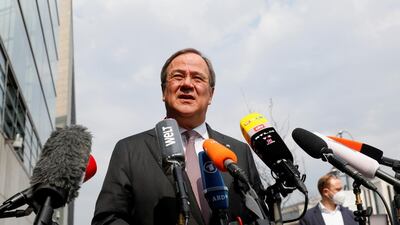Armin Laschet won the race to lead Germany’s conservatives into the post-Angela Merkel era on Tuesday after his rival Markus Soeder stepped aside.
Mr Laschet, an affable centrist ally of Ms Merkel, will seek the chancellorship at September’s election as the joint candidate of the CDU/CSU alliance.
But his bruising standoff with Mr Soeder left the bloc in disarray as it battles a buoyant Green party and faces widespread criticism over its handling of the pandemic.
Mr Soeder, who leads the smaller Bavaria-only CSU, had entered the race nine days ago and touted his superior poll numbers to Mr Laschet.
However, he had said he would accept the verdict of the larger CDU, which gave its backing to Mr Laschet at an hours-long meeting on Monday evening.
After talks which stretched into the early morning, Mr Laschet won a 31-9 vote which prompted Mr Soeder to quit the race on Tuesday.
"We will support him without resentment and with all our strength. I can say that for myself personally and I believe also for the CSU," Mr Soeder said.
Mr Laschet’s victory makes him the favourite to become chancellor of Germany when Ms Merkel bows out after 16 years in power.
There was no clear mechanism to resolve the standoff between the CDU and CSU, so the decision ultimately hinged on one backing down.
While Mr Laschet was elected CDU leader in January and had the backing of party executives, some regional CDU branches had broken ranks and announced their backing for Mr Soeder.
Polls had showed Mr Soeder with higher ratings among the public, with one ARD survey finding that 72 per cent of conservative voters saw him as better suited to be chancellor.
However, Mr Laschet is the leader of by far the larger of the two parties and some in the CDU were reluctant to let the CSU hold sway over the alliance.
Only twice before, in 1980 and 2002, has Bavaria’s CSU put forward the candidate for the joint conservative ticket.
On the latter occasion, then-CDU leader Ms Merkel agreed to stand aside in favour of the CSU’s Edmund Stoiber, who went on to lose the election.
Merkel's party faces election battle with Germany's Greens
Polls suggest the CDU/CSU could fall below 30 per cent of the vote at the election, which would be their worst performance in post-war Germany.
The parties’ standing has fallen sharply in recent months amid angry criticism of Germany’s handling of the third wave of the pandemic.
However, they are still on course to be the largest grouping in the next parliament, with the Greens poised to come second.
In contrast to the public battle in the CDU/CSU, the Green party’s two co-leaders decided in private which of them should seek the chancellorship.
The decision in favour of Annalena Baerbock, 40, a former trampolining medallist credited with helping to modernise the party, was announced on Monday.
The CDU, CSU and Greens could potentially form a coalition after the election, an alliance which has happened at state level but not in the federal government.
Alternatively, the Greens could be able to form a majority with the Social Democrats and the pro-business Free Democrats.
Such a coalition would send the CDU and CSU into opposition for the first time since Ms Merkel took power in 2005.
Mr Laschet is seen as a centrist ally of Ms Merkel who would continue her moderate course.
However, as premier of Germany’s most populous state, North Rhine-Westphalia, he has clashed with her over Covid-19 restrictions.


